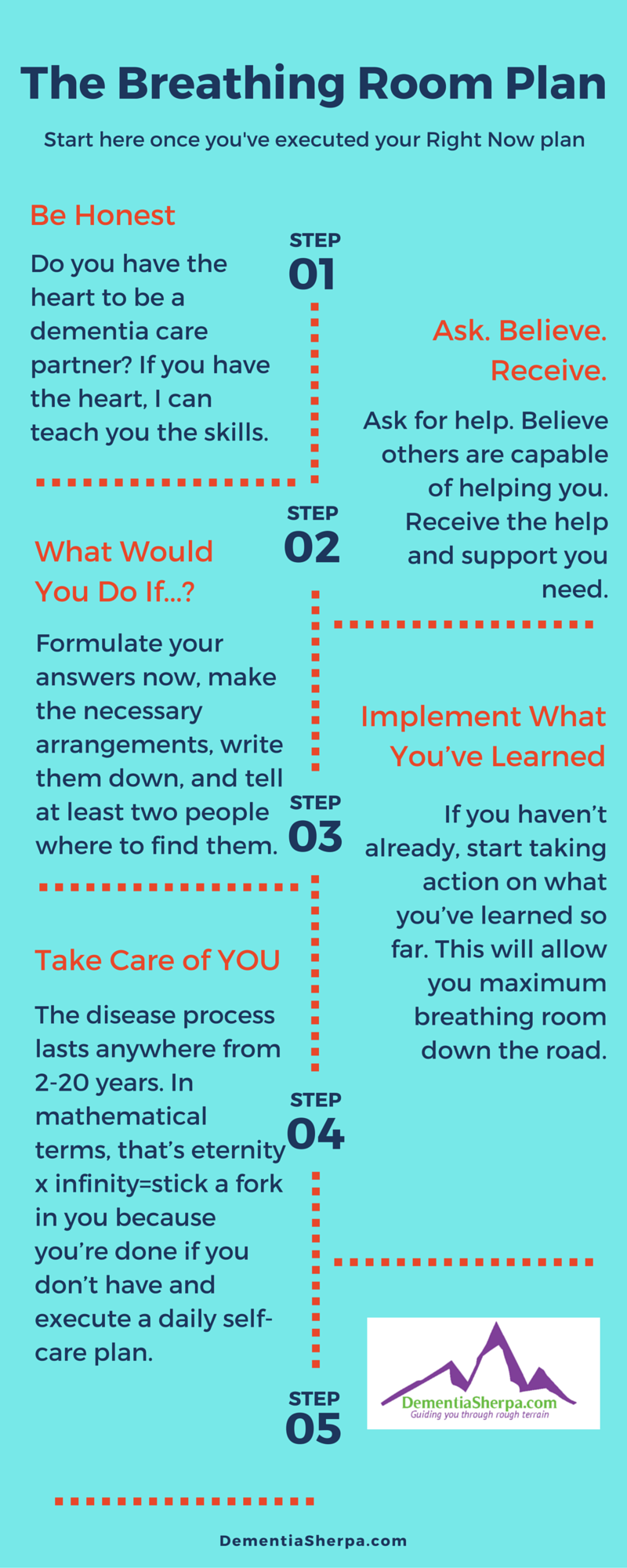The Breathing Room Plan
The Right Now Plan outlines five steps to take immediately when you suspect your parent or partner has dementia. Picking up from there and assuming you’ve executed those steps, now it’s time for a plan that gives you some breathing room.
I know it may not feel like you have any–or ever will have again. But trust me when I tell you to take advantage of the time you have now. Use it to create some breathing room for yourself.
Don’t end up plunged back into decision-making mode in the midst of a crisis.
Be Honest
Do you have the heart to be a dementia care partner? If you have the heart, I can teach you the skills.
On the other hand….I did a survey for dementia care partners in 2016. Only 50% of respondents said they’re doing this because they want to. That leaves a whole lot of people stuck in the have-to boat, which is always a bad place to be.
Note there’s a significant difference between “bad place” and “bad person.” If you don’t have the heart for this, that just means you need help with care partnering. Being honest with yourself is the first step.
Ask, Believe, Receive
Ask for help.
Believe others are capable of helping you and adequately caring for your loved one.
Receive the help–and the break–you need.
For some weird reason, we think asking for help is a sign of weakness. And yet, if I suggested you fix your young child’s broken bone using some duct tape in the garage, you wouldn’t go for it. Because you know part of being a good parent is seeking expert help appropriate to the circumstance at hand, right?
Chances are very good no one is mistaking you for Wonder Woman right now. So just cop to the reality of your situation and ask for what you need.
Don’t Dilly-Dally
Start asking for help now. Later in the disease process, you will become the center of the universe for your loved one.
As the disease progresses, she will no longer be able to hold onto a thought long enough to carry it through to a meaningful action. And she will lose the concept of object permanency. Those two things together mean you will be shadowed, followed from room to room, and expected to make everything okay.
Start introducing respite care now to avoid separation anxiety-induced meltdowns later.
Learn The Answers To The “What Would You Do If?” Game
What would you do if your parent wanders away from home in the middle of the night? What would you do if your sister can’t provide respite care when you need it?
How about if you have a family emergency on the other side of your family? (This actually happened in my family, and it was not pretty.) What would happen to your loved one if you get in an accident and can’t provide care?
Formulate your answers now, make the necessary arrangements, and write them down. Then tell at least two people where to find the instructions.
Implement What You’ve Learned
If you haven’t already, start taking action on what you’ve learned so far. This will allow you maximum breathing room down the road. Even if it’s only making one phone call or scheduling one appointment,take action today. Your future self is already thanking you!
Two added benefits to taking action? One, you’ll likely be surprised at how much knowledge you’ve already acquired. (Kudos!) And two, once you start, you’re building momentum. Momentum makes everything else that much easier.
Take Care of YOU
The disease process lasts anywhere from 2-20 years. In mathematical terms, that’s eternity x infinity=stick a fork in you because you’re done if you don’t have and execute a daily self-care plan.
Nothing will give you more breathing room than taking care of yourself. Take the caregiver burden quiz to see where you are now, and what adjustments need to be made. If you’re already in the danger zone, please reach out for help ASAP.
Write This On A Sticky
Friendly reminder: you are never, ever alone!
No matter how isolated you may feel, the truth is that I’m right here on the other side of the screen and I am always rooting for you! Reach out any time.
Updated 10/21/17
Christy Turner is the founder of DementiaSherpa.com and has enjoyed the privilege of working with 1,123 people living with dementia and their families. Follow on Facebook, Google+, Instagram, Pinterest, Twitter, and YouTube. Content varies across platforms.

